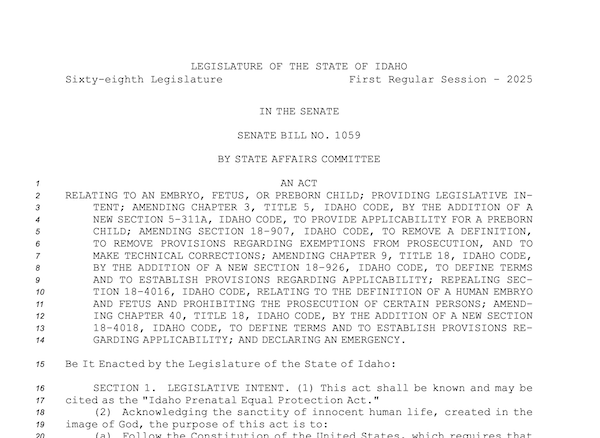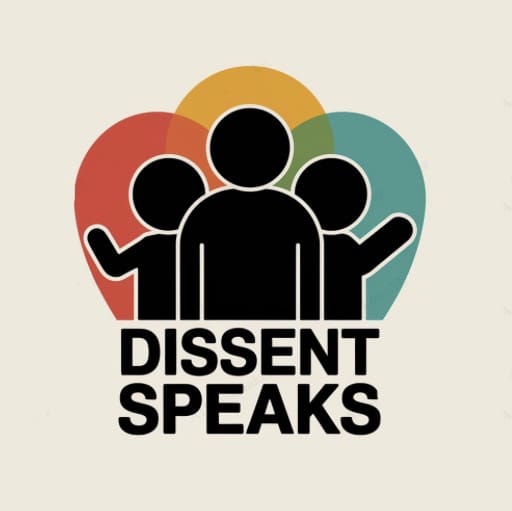In early 2025, Idaho’s legislature introduced Senate Bill 1059, titled the “Idaho Prenatal Equal Protection Act.” This legislation represents one of the most sweeping attempts to redefine personhood in American legal history, with potentially far-reaching implications for healthcare, civil rights, and the broader national debate on reproductive rights. This analysis examines the bill’s language, potential impacts, and what it could mean for Americans both in Idaho and beyond.
Understanding the Bill’s Core Provisions
Senate Bill 1059’s central premise is the legal redefinition of personhood to include “preborn children” from the moment of fertilization. The bill defines a preborn child as “a living human being before birth from the beginning of biological development at the moment of fertilization upon the fusion of a human spermatozoon with a human ovum.”
This seemingly straightforward definition carries profound legal implications. The bill aims to amend multiple sections of Idaho’s criminal code, particularly those dealing with aggravated battery and homicide, to extend full legal protections to embryos and fetuses from the moment of conception. Furthermore, the legislation includes an emergency clause for immediate implementation upon passage, suggesting an urgency that merits careful scrutiny.
Analysis of Language and Intent
The bill’s language reveals several crucial aspects worth examining:
First, the choice of terms like “preborn child” rather than medical terminology like “embryo” or “fetus” reflects a deliberate framing choice. This language emotionally and legally equates a fertilized egg with a fully developed person, which has significant implications for both medical practice and legal interpretation.
Second, the bill’s emergency clause, declaring an immediate need for implementation, suggests a strategic urgency that warrants examination. As noted in the research, this rapid implementation “leaves little room for public debate or correction,” potentially circumventing normal legislative deliberation processes.
The legislative intent is framed in constitutional terms, explicitly referencing both U.S. and Idaho Constitutions’ equal protection clauses. However, this framing raises questions about potential conflicts with existing constitutional rights and medical practices.
Impact on Americans
The potential effects of this legislation extend far beyond Idaho’s borders:
Healthcare Impact
Medical professionals face particularly stark challenges under this law. The research indicates that healthcare providers might need to:
- Re-evaluate standard medical procedures to avoid potential criminal liability
- Modify insurance coverage due to increased legal risks
- Navigate complex ethical and legal dilemmas in emergency care situations
A telling quote from the research notes that the bill “could criminalize abortion, jeopardize women’s health, and chill medical practice.” This suggests potential delays in necessary medical care as providers grapple with legal uncertainties.
Economic and Social Effects
The socioeconomic implications are significant:
- Healthcare Access: The research suggests disproportionate effects on “low-income and marginalized women who may not have the resources to travel out-of-state for care.”
- Medical Brain Drain: There’s a real possibility of an “exodus of healthcare professionals from the state,” potentially creating healthcare deserts in already underserved areas.
- Legal System Burden: The amendments to criminal statutes could lead to increased litigation, straining judicial resources and potentially creating inconsistent enforcement patterns across different jurisdictions.
Factual Evaluation vs. Propaganda Elements
When examining the bill’s presentation and supporting materials, several elements merit careful consideration:
Verifiable Facts:
- The bill explicitly amends specific sections of Idaho Code
- It contains clear legal definitions and procedural requirements
- The emergency clause for immediate implementation is a standard legislative tool
Potentially Propagandistic Elements:
- The moral and religious framing of legal concepts
- The use of emotionally charged terminology in place of medical language
- The presentation of complex medical and ethical issues in absolute terms
The research notes that the bill is “written in legal jargon that may be inaccessible to the general public” while using “purposefully moralistic and constitutional” language to frame the measure.
Actionable Steps for Readers
Given the complexity and potential impact of this legislation, here are concrete steps readers can take:
For Idaho Residents:
- Contact your state representatives to express your views on the legislation
- Engage with local medical and legal professionals to understand the practical implications
- Document and report any healthcare access issues that arise from implementation
For Healthcare Providers:
- Review existing protocols and procedures in light of new legal definitions
- Consult with legal experts about liability concerns
- Document thoroughly any cases where the law affects medical decision-making
For All Americans:
- Stay informed about similar legislation in your state
- Engage with professional organizations tracking these legal changes
- Support research and reporting on the effects of such legislation
Conclusion
Senate Bill 1059 represents a significant shift in how American law might treat questions of personhood and medical care. While proponents argue it ensures equal protection under law, critics warn of serious unintended consequences for healthcare access and medical practice.
The research suggests this bill could serve as a model for other states, making it crucial for Americans to understand its implications regardless of their location. As similar legislation emerges across the country, the debate over these issues will likely intensify, affecting healthcare policy, legal precedent, and civil rights nationwide.
This analysis reveals the need for careful consideration of how legal definitions interact with medical practice, and how theoretical rights might affect practical healthcare delivery. As one source notes, the ultimate impact will depend not just on enforcement in Idaho, but on “the outcomes of ongoing legal challenges” that will likely shape the national conversation on these issues for years to come.


